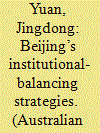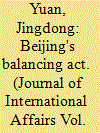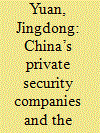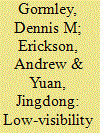|
|
|
Sort Order |
|
|
|
Items / Page
|
|
|
|
|
|
|
| Srl | Item |
| 1 |
ID:
158731


|
|
|
|
|
| Summary/Abstract |
China has in recent years been actively engaged in multilateral diplomacy. From the Shanghai Cooperation Organisation and the Conference on Interaction and Confidence Building Measures in Asia to the Asian Infrastructure Investment Bank and the One Belt, One Road initiative, Beijing is pursuing strategies and promoting norms that are viewed as concerted efforts by China to challenge some of the key institutional arrangements of the existing international order. This article seeks to discuss these contentious issues and assess the rationales, approaches and implications of Chinese diplomacy in initiating and promoting what can be considered as institutional-balancing strategies. The author suggests that the rationales behind these Chinese strategies have as much to do with Beijing’s shifting priorities and the need to address them as with reflecting a degree of dissatisfaction with existing multilateral institutions. And there are more marked differences in Chinese motivations and modalities in security arenas than in economic areas. However, it would be overstating Beijing’s intentions and capabilities if these China-sponsored initiatives are viewed as direct challenges to the existing international and regional orders.
|
|
|
|
|
|
|
|
|
|
|
|
|
|
|
|
| 2 |
ID:
103688


|
|
|
| 3 |
ID:
167851


|
|
|
|
|
| Summary/Abstract |
China’s Belt and Road Initiative (BRI) is an ambitious project aiming to transform the economic landscape along its route in the areas of trade, investment, and energy supplies. It makes as its focal point the connectivity between China and Eurasia, South Asia, and the Indian Ocean. South Asia’s location presents China with significant strategic opportunities as Beijing seeks to expand its economic presence in the subcontinent by providing resources in infrastructural development, particularly the construction of seaports. With growing Chinese trade and investment in the region, Beijing is also extending its diplomatic influence into what has long been considered as India’s sphere of influence. With longstanding strategic distrust and unresolved territorial disputes, New Delhi is suspicious of Beijing’s intentions and concerned over the latter’s growing influence into a region it has long considered its sphere of influence. In this context, the BRI has the potential to intensify Sino–Indian rivalry, and the Modi government has indeed explored and launched initiatives to counter Chinese diplomatic activities. It remains a challenge whether and how Asia’s rising powers can reduce their trust deficits and explore areas of cooperation made possible by the BRI, working toward a cooperative, mutually beneficial future for Sino–Indian relations and the region as a whole.
|
|
|
|
|
|
|
|
|
|
|
|
|
|
|
|
| 4 |
ID:
188320


|
|
|
|
|
| Summary/Abstract |
China’s private security companies (PSCs) have become increasingly active actors in meeting the growing demands of Chinese companies operating in high-risk foreign environments for protection and security of both their assets and employees. While growing rapidly in recent decades, Chinese PSCs are relatively new in providing overseas services, remain constrained by lack of well-trained and fully-equipped personnel, and operate under legal uncertainties. Nonetheless, they perform critically important functions in protecting and promoting Chinese security and economic interests abroad. This article provides a preliminary analysis of Chinese PSCs’ introduction to the overseas markets and assesses their performances against opportunities and challenges.
|
|
|
|
|
|
|
|
|
|
|
|
|
|
|
|
| 5 |
ID:
143831


|
|
|
|
|
| Edition |
Alphaq Editions
|
| Publication |
Washington, DC, National Defense University Press, 2014.
|
| Description |
xx, 165p.: ill.hbk
|
| Standard Number |
9789385505539
|
|
|
|
|
|
|
|
|
|
|
|
Copies: C:1/I:0,R:0,Q:0
Circulation
| Accession# | Call# | Current Location | Status | Policy | Location |
| 058475 | 358.170951/GOR 058475 | Main | On Shelf | General | |
|
|
|
|
| 6 |
ID:
151694


|
|
|
|
|
| Summary/Abstract |
This article takes stock of the evolution of bilateral economic ties between China and India since the early 1990s. It analyses the factors that have contributed to the expansion of this important aspect of their relationship, but also highlights the obstacles, in particular the politico-strategic variables, to further expansion of economic ties, including investments. It argues that while both Beijing and New Delhi recognise the importance of trade and investment in their relationship, future growth in bilateral economic ties depends on how the two countries can successfully deal with issues such as trade imbalance, market access, infrastructure, and regulatory environment. But more importantly, Beijing and New Delhi must seriously address each other’s security concerns, including those areas that affect their perceptions of economic security and consequently their policies towards bilateral and regional cooperation.
|
|
|
|
|
|
|
|
|
|
|
|
|
|
|
|
|
|
|
|
|